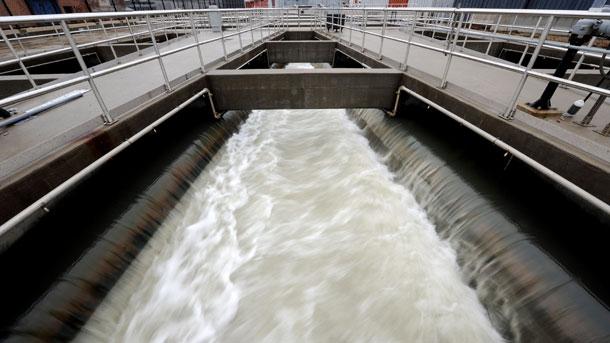Bulgaria is situated in Southeast Europe and just like most countries from this region does not have unlimited water resources. No large and deep rivers such as the Thames, Volga, Seine or Rhine cross Bulgaria and the average annual precipitation is not that abundant. Meanwhile, 75% of the precipitation in this country evaporates. Although the annual fresh water quantities in Bulgaria amount to 106.7 billion cubic meters and Bulgaria places among the European countries with significant water quantities, water shortages can occur, especially in regions with low precipitation, higher density of the population and water consuming industrial production.
That is why water in Bulgaria should be viewed as precious and limited natural resource and used very carefully and sparingly. According to official statistics, nearly 57% of the water quantities in Bulgaria are lost on the way from the water supplier to the Bulgarian consumers. In other words, over half of the water which has to be used by the households and the business merely evaporates or sinks into the ground. Of course, there are water losses in all other countries worldwide, but the scale of water loss in Bulgaria is unacceptably high, which means that the whole water sector is in poor condition, because water loss in this country is almost twice higher than in other EU member states. Neither the business, nor the households can function without fresh water. This natural value, together with air, soil and light is among the most essential worldly goods. That is why people are very sensitive on the topic regarding water prices. Prices of fresh water are different in all Bulgarian regions and depend on the water source and the state of the water infrastructure. Drinking water is supplied to the Bulgarian consumers from various sources- dam lakes, rivers, springs and wells. According to official data, in 2016 the total quantity of used water in Bulgaria, including fresh water amounted to 4,721 million cubic meters, which was similar to the usage in the previous year. The average consumption of fresh water per day per capita amounts to 100 liters. Water is supplied to the Bulgarian households and businesses through steel and asbestos-cement pipes and 86% of them were built during the communist period. The Bulgarian households use 65.4% of the water supplies, the service sector uses 11.1% and the Bulgarian industry consumes 13.8% of the water.
 The Bulgarian authorities are aware of the fact that huge water quantities are wasted and have been trying to take some measures to reduce water loss. However, there are still water supply restrictions in some Bulgarian regions and consumers receive fresh water supplies in certain hours or days of the week only. Many improvements in the water sector have been made with money allotted by EU funds, which enabled many Bulgarian towns and villages to change the old water supply infrastructure, including the drinking water pipes and the waste water pipes.
The Bulgarian authorities are aware of the fact that huge water quantities are wasted and have been trying to take some measures to reduce water loss. However, there are still water supply restrictions in some Bulgarian regions and consumers receive fresh water supplies in certain hours or days of the week only. Many improvements in the water sector have been made with money allotted by EU funds, which enabled many Bulgarian towns and villages to change the old water supply infrastructure, including the drinking water pipes and the waste water pipes.
However, these measures cost money and the bill has to be paid by the Bulgarian citizens themselves. That is why in 14 out of all 28 Bulgarian districts the water prices went up between 2.5% and 20% on January 1. Fifteen average-sized Bulgarian cities with developed industry, trade, agriculture, tourism and service sector, are situated in these fourteen districts. Of course most Bulgarians and businesses did not like this measure, because the local business will also have to pay higher electricity bills, as electricity price for the Bulgarian industry went up between 30% and 65% in the beginning of 2018. At the end of the day the bill will be paid by the end users and the higher price of water and electricity will have significant impact on inflation and the purchasing power of the population. According to some experts, this would trigger high inflation which may reach 5% on an annual basis. The consumerist enthusiasm of the Bulgarian citizens is about to end soon after they started to earn some more money due to the positive development of the Bulgarian economy.
English version: Kostadin Atanasov
Photos: libraryAccording to Bulgarian Orthodox tradition, it is customary on major Christian feast days to make a voluntary offering known as kurban. In general, this involves the distribution of food among Christians, which has a special prayerful purpose. Theologians..
Only on the Day of Bravery and Holiday of the Bulgarian Army (May 6), we will provide our visitors with the opportunity to enter three of perhaps the most interesting machines from our outdoor exhibition. This does not happen every..
Dozens of enthusiasts and nature lovers will kick off the 44th edition of the Move and Win campaign with a spring hike to Bozhur Hut. The first walk will take place on 3 May. The meeting point will be the Vladishki Bridge in Veliko Tarnovo . The..
The independent mayor of Bucharest is the new president of Romania Nicusor Dan won the second round of the presidential election in..
The work of the Bulgarian Sunday School "St. St. Cyril and Methodius" in Egypt has been restored after a long interruption, announced the Minister of..
On the occasion of International Children's Day - June 1, the Bulgarian State Railways is organizing a retro attraction trip from Sofia to Pernik and back..

+359 2 9336 661
